Can you match the trick or not? That is the only question in a game of Slvsh. Led by Matt Walker and Joss Christensen Slvsh has taken the freeskiing world by storm, bringing the classic playground game of HORSE to the mountains. While a variety of different games have emerged, the classic game of Slvsh pits two riders against each other in a “match my trick” format. Fall and you get a letter, first one to “SLVSH” loses.
In a world of internet armchair-quarterbacks and judging Slvsh brings a unique and fresh look to competition. As Walker explains, “all other contests in skiing are based off the idea that difficulty can be judged. Slopestyle, online contests, FWT, Halfpipe, Rail Jams, etc all have judges grading technicality, aka, how hard they thought your trick was for you… We really don’t know how hard a trick is for you and we don’t care. We just care if the other guy landed it or not.”
Matt and Joss took the time to talk to us about Slvsh, why it’s unique and how it’s bringing a fresh look to the ever more fragmented freeskiing scene.
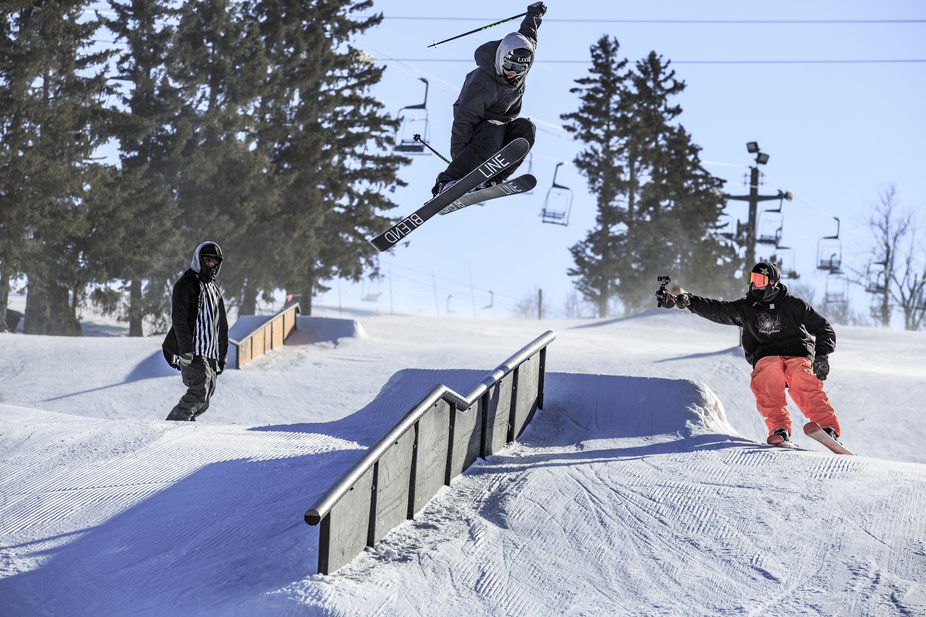
What has the progression looked like from when you guys first brought the idea online to where it is now?
Walker: I think the biggest progression so far has been in the quality of filming. We started out with shaky Hero 3’s on sticks, without mics, but now, thanks to GoPro and gimbals, we have smooth Hero 4 Silver shots. Hopefully the next big progression is in better film equipment and better production as well as more Slvsh Cups, so we can start supporting the riders better.
Joss: Having gone from a late night bar conversation in New Zealand while we were getting ready for the Olympic qualifying season to having a site filled with games and content blows my mind. As Matt said The Gopro gimbals have changed everything for us. We went from average follow cams to movie quality shots. Plus our editing skills have increased significantly.
Where is Slvsh headed in the future?
Walker: We will continue to try different games, see what works and what doesn’t. We definitely want to host more Slvsh Cups. Try different formats in different terrain. I’d like to see more people recognize it as a way to compete. We also have something pretty cool being announced soon, so stay tuned
Joss: Also, we’d love to create non-game content. Edits or movies with riders of all different styles and backgrounds would be really cool to produce. Along with new types of content that we hope will share the culture of our sport.
[center]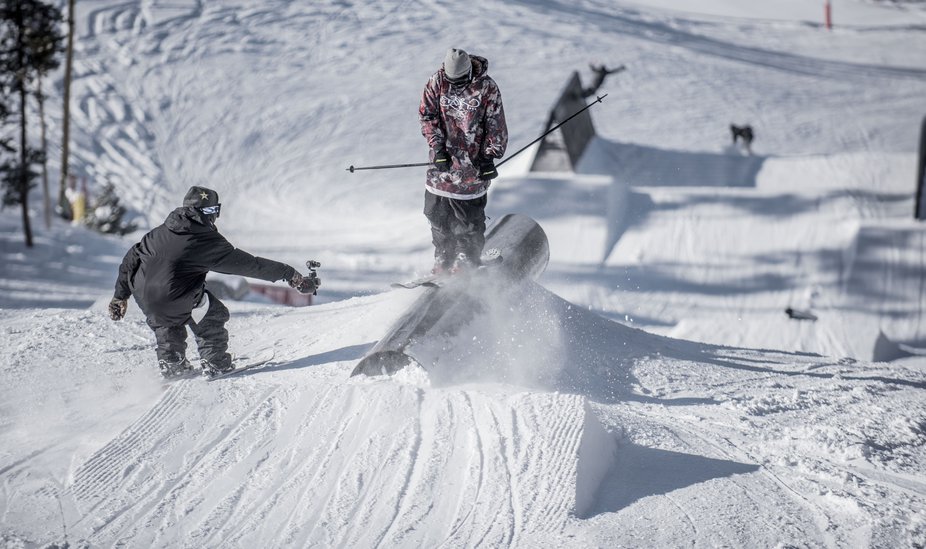
What is Slvsh’s biggest contribution to skiing? Why is it different?
Walker: I think Slvsh’s biggest contribution is simplicity. Slvsh is a type of contest that rewards creativity, adaptation and consistency. It’s nice that people can take the regular weekly games and make the terrain, conditions and opponents comfortable to the point where it’s almost a formatted edit, but at it’s core, Slvsh is still a contest, there is a winner.
I think it’s different because all other contests in skiing are based off the idea that difficulty and style should be judged. Slopestyle, online contests, FWT, Halfpipe, Rail Jams, etc all have judges grading technicality and style, aka, how hard they thought your trick was for you and how pretty they thought your trick was. The problem is then explaining that process so it makes sense, every week, to an audience who can then follow along. Judged contests happen and people who are fluent in speaking freeski can chat for days about who should have won and why, but rarely will everybody end up on the same page. Lay-people can’t partake in this conversation, they don’t know which tricks are harder, they don’t care, and most will not take the time to learn about it. They just think it's cool to watch skiers flip through the air, it’s more a circus than a sport to them.
Slvsh was not even close to inventing the match-my-trick format, we just realized it's a simple way to somewhat maintain freedom in skiing, while also comparing skiers. We really don’t know how hard a trick is for you. We just care if the other guy landed it or not. We’ve heard the SLVSH format’s ease is nice for parents and viewers who don’t live and breathe park skiing, but are interested. People don’t necessarily have to know what the trick call is, they don’t have to freeski, or even ski it to understand it. So, hopefully the “he did it, or he didn’t” simplicity gets more people into watching skiing.
Joss: Slvsh was created to give back to the ski world. As both skiers and competitors we have seen the industry inside and out. We almost felt that the sport was heading in a direction that could possibly lose a lot of interest and respect. I hope that our biggest contribution has been inspiring every type of skier no matter the skill level to get out and have a friendly battle on the slopes. It doesn’t matter if you’re ranked #1 in the world or if you just learned to spin an 270 onto a box, you can still play a Slvsh game and it will still be enjoyable.
Talk to me about the second Slvsh Cup which is currently being released.
Walker: It’s our first 16-man cup. It is taking place at Sunset Park, which is a part of Grandvalira in Andorra. We are going to try a North America vs. Europe themed event. I’m really excited that we have a wide array of park skiers for this one. We’ve got very technical skiers, very creative skiers and some skiers who ski beautifully. The venue is the same park as where Luka and Noah played with Henrik reffing last year, very skatepark-esque. I hope everybody is as excited as we are. Hopefully the weather is good.
[center]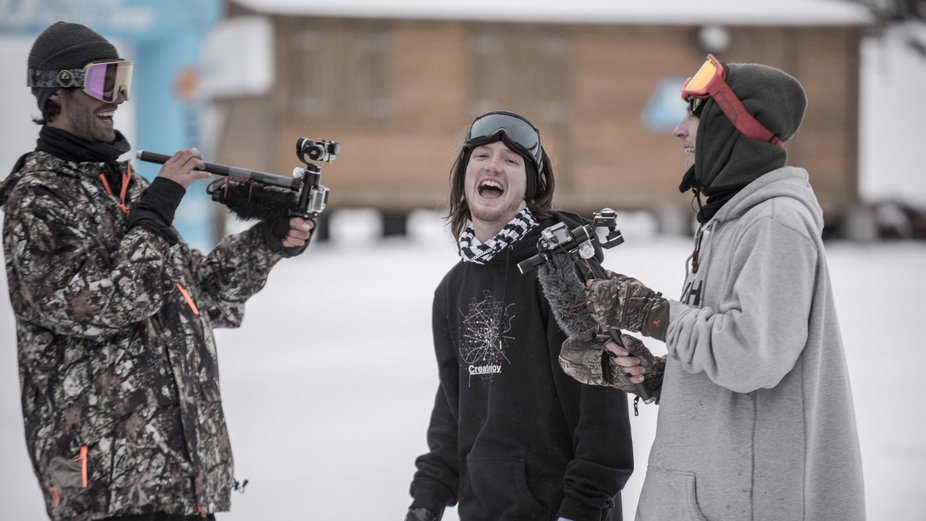
Slvsh has been able to bring in skiers from all kinds of different backgrounds and styles, from hardcore competitors, to The Bunch. Why do you think this format is so widely applicable and successful?
Walker: I think freeskiing is about creation. The original freeskiers hated the rules and regulations of FIS, USSA, and coaches telling them what tricks they couldn’t do, so they broke off to create the tricks they envisioned. They created new tricks daily. I think all film skiers and many of the comp skiers still have that desire to create and ski down the hill how they want. They take inspiration from other skiers, snowboarders, skaters, surfers, bump skiers, musicians, artists, who or whatever, and weave it into their own personality of skiing.
Film skiing seems more like art to me. They’re always creating. There are no rules, just a snowy hill to do whatever you want down. But, I think deep down, some film skiers have some desire to be compared (they take pride in winning “best segment” or “best movie” at IF3) but they just don’t want to do traditional judged contests for whatever reason. Slvsh can be played anywhere, so Sander and Giray can compare their type of skiing in a comfortable setting, same with Will and Khai.
On the other hand, comp skiing is all about pressure and competition, but there is little room for creativity, innovation, or uniqueness in today’s contests. In order to win a contest today, you’ll need all four doubles with a grab that you can hold, a few solid rail tricks, and maybe a triple. The path from your first 360 to X-Games Gold is becoming clear, and there isn’t time to create along the way. There is no incentive for somebody to learn a new variation of 900 if they know the 1260 or 1620 will outscore it every time, so they skip the creation and learn only what they know has been proven to win. I think most contest skiers love riding away from new tricks too and Slvsh incentivizes them to be as complete of a skier as possible while also creating new tricks on top of the basics.
Vinnie may currently be the only frequent competitor who is an exception to this. He does the tricks he wants, and the judges think they’re hard enough to beat traditional tricks. But, a few years ago, his double bio was getting beat by triples. Vinnie didn't care, kept skiing how he wanted and now his tricks are beating triples. But, this goes back to the ease of explaining that to lay-people.
Regardless, I think contest skiers love riding away from new tricks, and Slvsh incentivizes them to be as complete of a skier as possible and create new tricks on top of the basics.
Joss: Walker pretty much nailed it on this one. I’ll add, Big contests such as Dew Tour, Xgames, Air + Style, Olympics Etc. are fun for everyone to watch, but the level of competition is so high that it’s hard for most people to relate to this type of skiing. The fact that young shredders can watch their favorite skier mess up a trick they just stomped earlier that day is amazing. The variety of tricks that a Slvsh game will make a skier do/try shows our sport for what it really is. Slvsh is a way to express passion and culture of the sport more than just following a formula to win big events.
Walker, one of the things that make action sports great and differentiates us from traditional sports is that style was respected from the beginning and built into these sports? Does Slvsh care about style?
Walker: If you know me at all, you know I have an extremely high respect for style. My favorite skier of all time is Rainville, I still watch his old Level 1 segments weekly. I frequently think that style skiers get underscored in competitions. I think Duncan Adams should’ve podiumed much more than he did. But, that is my opinion and style is completely subjective. I think Rainville has the most style, others think Tom, Henrik, AD, Duncan, Bobby have the most. Nobody is right nor wrong.
The conversation then goes to art vs sport. If competition skiing is art, then ski competitions should be like film awards or art shows, winning is novel, but they don’t make or break careers and don’t mean much. Just watch skiers create, buy their movies, buy their segments, buy their gear, everybody creates, has fun and somebody gets a ribbon. But, if competition skiing is a sport, then everybody on the hill, and off, should know how one wins and loses.
I’d say that even though basketball and football players don’t get extra points for having style, style is still a big part of those sports. Look at Tim Duncan, in my opinion, he plays very mechanical basketball and when he gets the ball in the hoop, it’s worth 2 points. On the other hand, Michael Jordan dunks from the free throw line with his freaking tongue out. He doesn’t get more than 2 points for the dunk, but his dunks are legendary. Everybody remembers watching him dunk and Nike started an entire brand around his silhouette. When you perform the task beautifully because it’s how you want to, not because you get more points for doing so, it makes a bigger impact than extra points ever could.
[center]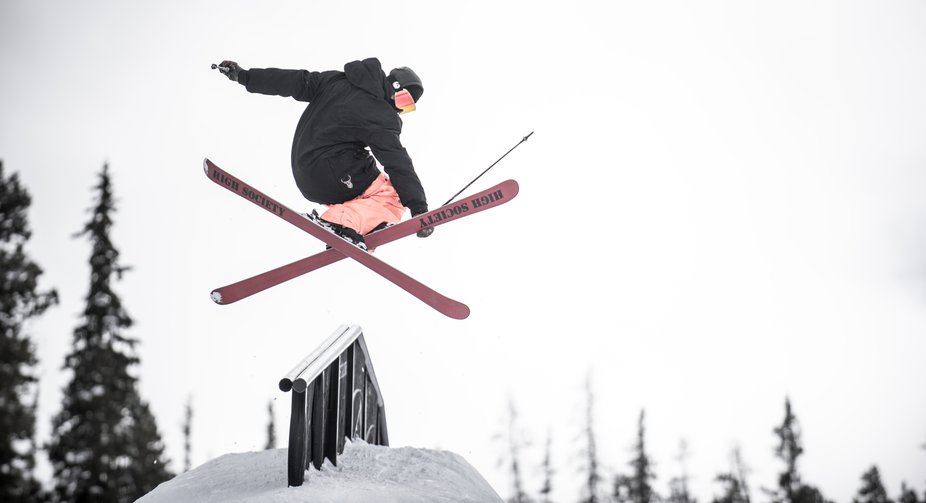
Walker, we had a long conversation at WCS about the state of skiing. A big part of that conversation was about pro skiers giving back to the ski scene, is this your contribution? How do you feel about that?
Walker: I guess so. It’s what I want to see happen in skiing, and Joss feels similarly, so we are creating it. Hopefully it inspires other skiers to realize they can change what they want to see in the industry. I hear gripes all the time about things people don’t like in the industry and I think if they realize that they can change them, then hopefully they will try.
What is your favorite part about Slvsh?
Walker: Watching guys who rarely do contests, usually film skiers, duke it out. I’m very excited every time a rail battle with the Bunch, Will, Khai, Dale, LJ, etc come up. That also goes for the mountain games, too. Their trick selections are always either extremely tech, crazy, or mind blowing.
Joss: Getting to follow my friends from only a few feet behind as they try (and usually stomp) tricks they have never done before is such a rush. Then watching the footage later is even better. I really enjoy that I get to meet and ski with so many guys that I usually wouldn’t run into on the slopes. I’ve been so inspired by all the experiences so far that my passion and love for skiing has never been so strong.
What has it been like to see the community’s reaction to Slvsh?
Walker: We’ve had a great response from the community. The positive feedback makes me want to keep going. People seem to like the clean layout and ease of the site, as well as the format’s simplicity, filming and level of riding.
Joss: The reactions we’ve received over the past year have been amazing. So many of our friends, fellow skiers and randoms we’ve met along the way have been so supportive. We strive off of the community and the love we have received make all the work and effort worth it. I have had family members and friends who will reach out to me saying that Slvsh has really taught and informed them what we do way better than just watching me compete. Thats a win for us, to spread knowledge about skiing.
[center]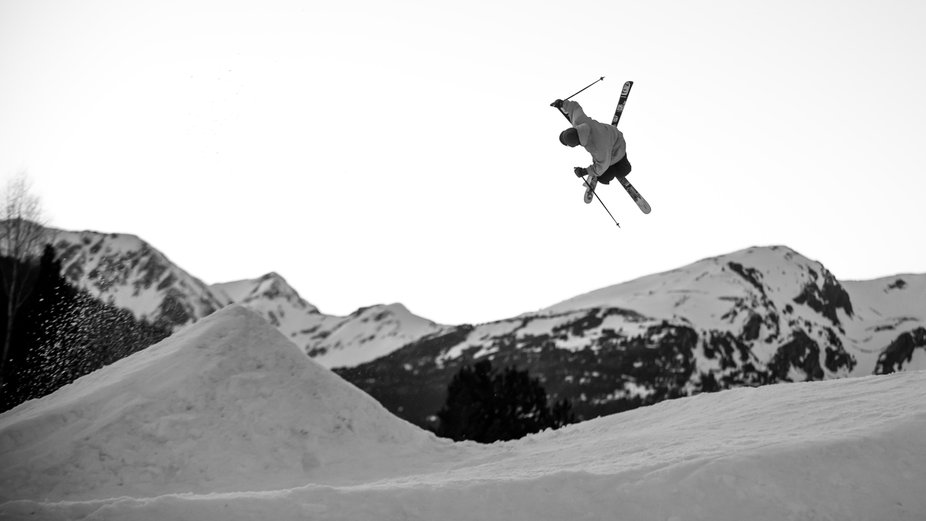
What has the riders’ response been to Slvsh? Are the skiers as stoked on it as the fans?
Walker: Most everybody is stoked, a few aren’t. We love working with the skiers who are stoked. Everybody is a bit nervous at the beginning of a game, but halfway through, when they are grooving and have landed a couple tricks and they express how much fun it is. That makes me very happy. Some skiers aren’t stoked on it, probably because they’re just focused on other things, but overall, a lot of riders are stoked on it, so we are happy.
What are some growing pains that you guys have faced?
Walker: We definitely had to learn to use Adobe Premiere, After Effects, Illustrator and Photoshop (thanks John, Kimmel, AJ, Rachel and Napes!) and how to work GoPros and gimbals and how to run a website and a company.
Joss: The whole production and filming aspect have been completely new to us. I really can’t thank Walker enough for taking huge initiatives to learning every part of running this type of business and passing down his knowledge to me. We are small now but we are learning quick!
Speaking of free content. Is Slvsh sustainable for you guys? Personally and monetarily? There is so much free content in skiing right now, how are you guys going to keep the lights on? Sponsors, monetization?
Walker: That remains to be seen. Right now, it isn’t. It is currently 100% funded out of our own pockets. If people find value in what we are doing, then the money will come. There is a ton of free ski content on Instagram and NS, but I think that people still desire to watch quality ski content, which is the idea behind Slvsh Theater. I think there is a, possibly large, audience that would watch a ski contest that they could understand, so S.L.V.S.H. games have potential value in them outside of core skiers.
But, right now, it’s just our website traffic, and it’s mostly just core skiers, so keep watching our videos, share them, follow us, and tell your friends about us. We are going to unveil more ways to support us soon, but for now, tell your friends about slvsh.com and buy Slvsh hoodies, hahah.
Joss: The ski industry right now is a really hard place for anyone on any side to really be sustainable. Like Walker said, we think we have some great ideas on how we can gain the support we need to really grow. The more support and love we get from the ski world the more we can give back.
[center]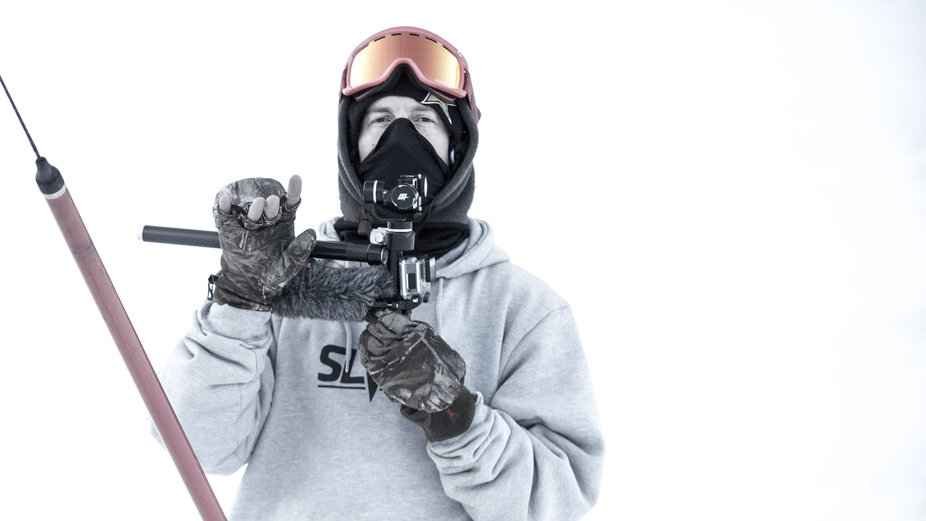

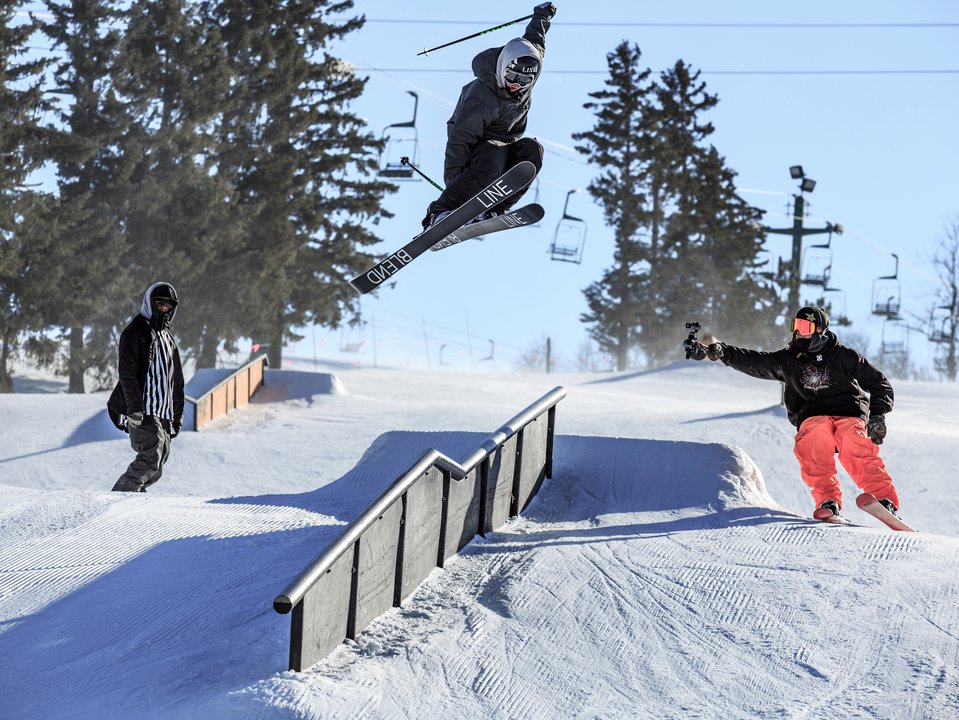
Comments